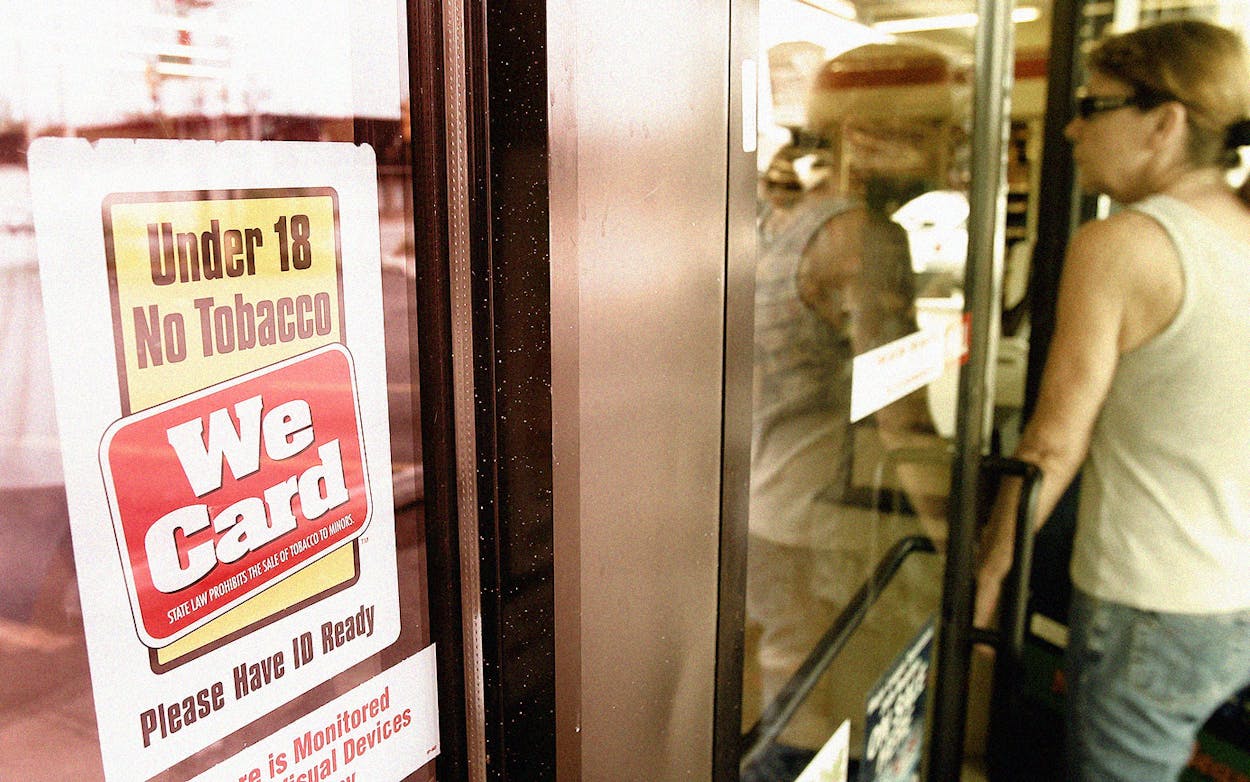There’ve been a number of legislative proposals over the past decade to raise the age at which it’s legal to buy tobacco products from 18, where it currently sits in Texas, to 21. Thus far, all of them have gone nowhere—but 2019 might be the year it happens.
If it does, it’ll be because of support from unlikely places: Lieutenant Governor Dan Patrick, whose party has historically been uninterested in making such a change, and Altria, the company once known as Phillip Morris, which brings in an annual revenue of more than $25 billion, primarily from tobacco products.
According to the Dallas Morning News, an Altria executive submitted testimony in support of the proposal earlier in March, declaring that the company “supports raising the minimum age to purchase tobacco products to twenty-one” and believes the measure should be enacted “without delay.” That comes as a reversal of a viewpoint that the company held as recently as the 2017 legislative session, when an executive offered testimony in opposition to that year’s version of the proposal. According to the paper, the new position was motivated by a statement last year from FDA commissioner Scott Gottlieb, in which he warned against what he called an “epidemic” of e-cigarette usage among teens. “We are supporting this step because we believe it is the most effective step available to reverse rising underage e-vapor rates,” the testimony said.
This makes sense. Joe Camel might have been a long time ago, but tobacco products are still marketed largely to children, implicitly if not explicitly—especially e-cigarettes, which come in flavors like “gummy bear” and “fruit loop.” Juul, the most popular brand, ran ad campaigns full of barely-out-of-their-teens models enjoying the product and acting silly in front of brightly colored backgrounds. (Altria acquired a 35 percent stake in Juul in December; on March 19, Juul released a statement supporting raising the tobacco purchasing age to 21.) Raising the age at which it’s legal to buy these products might not keep them out of the hands of 18-, 19-, and 20-year-olds, but it has potential to keep younger teens from getting them. There are plenty of 18-year-old high school students who can legally buy tobacco products and share them with younger friends and siblings, but there are fewer 21-year-olds hanging out with kids in their early teens.
Yet that doesn’t explain why Altria suddenly cares about keeping tobacco products out of the hands of teenagers. Phillip Morris has long recognized that its product needs to reach young people in order to create lifelong customers; a 1981 market research paper from the company observed that “Today’s teenager is tomorrow’s potential regular customer, and the overwhelming majority of smokers first begin to smoke while in their teens.”
One explanation might be that by preemptively jumping into this fight on the side of social responsibility, the company that owns a sizable stake in Juul is trying to head off even more severe regulations. Just this week, officials in San Francisco proposed a total ban on the sale of e-cigarettes until an FDA study, planned for 2021, is complete (California is one of ten states where tobacco products are only available to people 21 and up). Juul pushed back against the proposal, arguing that its product helps adults who currently smoke combustible cigarettes transition to a safer alternative.
Vaping might be safer than smoking, but it’s safer for people to do neither, which the measure from the Lege might help with. It might not—a study from the anti-nicotine organization Truth Initiative noted that although only 6 percent of teens buy their Juul products online, a whopping 89 percent of those who did so were able to buy them—but reducing teen access to tobacco products can’t hurt. Altria’s plan might be motivated primarily by a desire to get lawmakers around the country to see more extreme measures as unnecessary, but the end result could certainly help with the youngest teens. According to a 2015 study from the National Academy of Medicine, raising the age for tobacco products to 21 could have a 25 percent reduction on the number of kids ages 15 to 17 who start using them. The percentage of high school students using e-cigarettes has risen since that study (from 13 percent, in 2015, to 20 percent, in 2018), but the reasoning still holds weight.
Either way, it’s an issue that should be paid some attention. It looks like 2019 might be the year that the Texas Legislature finally does.
- More About:
- Politics & Policy
- Health








